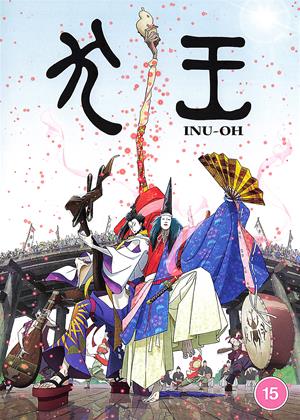
- General info
- Available formats
- Synopsis:
Inu-oh (voices of Holden Thomas / Avu-chan) is born with unique physical characteristics, and the horrified adults cover every inch of his body with garments, including a mask on his face. One day, he meets a boy named Tomona (voices of Jonathan Leon / Carter Young / Mirai Moriyama), a blind biwa player, and as Tomona plays a delicate song of tangled fate, Inu-oh discovers an incredible ability to dance. Inu-oh and Tomona become business partners and inseparable friends, using their creative gifts to survive on the margins of society, as song after song gain them notoriety and propel them to stardom. Through the songs, Inu-oh mesmerises his audiences on stage, and gradually begins to transform into someone of unequalled beauty. But why is Tomona blind? Why was Inu-oh born with unique characteristics? It is a story about the friendship of Inu-oh and Tomona, who dance and sing to get to the truth and break each other's curse. - Directors:
- Masaaki Yuasa
- Producers:
- Eunyoung Choi, David Jesteadt, Stephanie Sheh, Michael Sinterniklaas, Fumie Takeuchi, Akiko Yodo
- Voiced By:
- Avu-chan, Mirai Moriyama, Tasuku Emoto, Kenjirô Tsuda, Yutaka Matsushige, Joshua Waters, Sena Bryer, Cory Yee, Jason Marnocha, Keythe Farley, Holden Thomas, Jonathan Leon, Carter Young, Anjali Kunapaneni
- Writers:
- Hideo Furukawa, Akiko Nogi
- Aka:
- Inu-ô / King Dog / Dog King
- Studio:
- Anime Ltd
- Genres:
- Anime & Animation, Music & Musicals
- Countries:
- Japan
- BBFC:
- Release Date:
- 07/08/2023
- Run Time:
- 98 minutes
- Languages:
- English DTS-HD Master Audio 5.1, Japanese DTS-HD Master Audio 5.1
- Subtitles:
- English
- Formats:
- Pal
- Aspect Ratio:
- Widescreen 1.78:1 / 16:9
- Colour:
- Colour
- BLU-RAY Regions:
- B
- Bonus:
- Interview with Masaaki Yuasa
- Career Interview with Masaaki Yuasa
- Intermission 'Inu-oh and Tomoichi'
- Cast Interview
- Trailer
More like Inu-Oh
Reviews of Inu-Oh
Critic review
Inu-Oh (aka Inu-ô / King Dog / Dog King) review by Mark McPherson - Cinema Paradiso
Inu-Oh presents a unique blend of classic Japanese theater and 1980s rock opera excitement. It seems like a mixture that wouldn’t come together all that well. But this is a chocolate and peanut butter situation where it’s so impressively addicting that you can’t get enough of it. This anime is so full of music, love, and visual allure that I wish there were more anime films like this.
The film centers around two wrong men coming together in Japan 900 years ago. Tomona is a boy who was blinded when a magical sword killed his father. Inu-Oh is a boy cursed by his father to be a hideous and deformed being, unable to partake in his dad’s Noh theater productions. Tomona can play the biwa brilliantly, while Inu-Oh can sing like a rock legend. Tomona can tap into the spirits of lost souls with the aid of his dead dad, while Inu-Oh can bring their many stories to life, growing less deformed with each performance. It’s a match made in heaven that leads to some grand and intoxicating performances.
The tale of Inu-Oh is unique enough to engage any viewer. There are aspects of historical legends, classical Japanese theater, and supernatural allure. It’s also told beautifully with artistic choices in portraying everything from the haziness of the past to the sketchiness of Tomona’s blurred vision. The friendship between Tomona and Inu-Oh is easy to root for as they connect so well, and both desire to be seen. They feel bound by their parents to live up to the past but also want to make their voices their own. Their mission becomes boldly stated as the film goes on, highlighting how they want to be heard at this moment in time, a noble goal for any young person with something to say and the artistic means of expressing it.
Of course, the film's biggest draw is the concert performances put on by the musical duo. These sequences are incredibly sublime, using any means of light, shadow, and elaborate puppetry to bring their powerful songs to life. They revive the past by telling stories of fallen soldiers and naval campaigns involving whales in the most creative ways possible. I loved how the mixture of shadows, wires, and water created a fantastic illusion of a whale swimming across the water. The melodies are intoxicating enough that it’s no wonder the audience starts singing along. If you ever wanted to see Queen music sung in an anime style of old Japan, this is your chance to see something you don’t see in every anime movie. It should be noted that even the English dub doesn’t try to match the singing of the Japanese voice actors who deliver the masterful performances of the music professionals in the lead roles.
The relationship has great pain and tragedy and a thirst for rebellion in this wild story of music becoming a form of identity, learning from the past, and protest. The film's climax is a beautiful neon sequence of walking-on-water theatrics, out-of-body experiences of origins, and one ridiculously bloody moment of karmic satisfaction. Despite seeming to end on such a down note, the ending still has a twinge of hope about finding connections. While Inu-Oh’s voice may not shake the stuffy and corrupt nature of the shogun, it was still a chance to be known and find kinship with those who refused to stay in the shadows. Reading the queer allegory woven into this colorfully flamboyant and musically meaningful concert is easy enough.
Inu-Oh is one of the most unexpected anime films in the past few years, and it’s easy enough to recommend to any audience. If you love Queen and Japanese history, this film is a match made in heaven. It’s an unforgettable experience and makes one long for more anime rock operas alive with storytelling, visuals, and musical experimentation.

